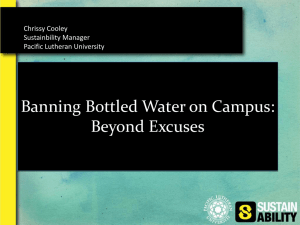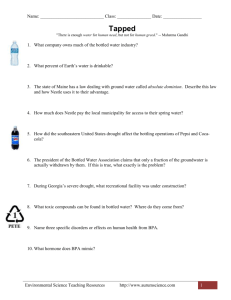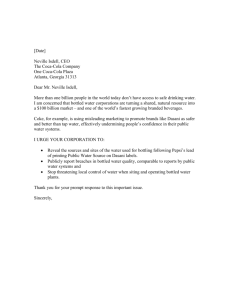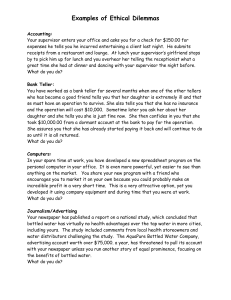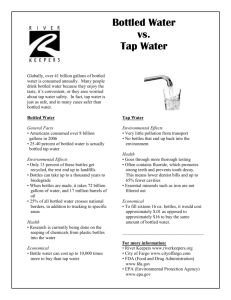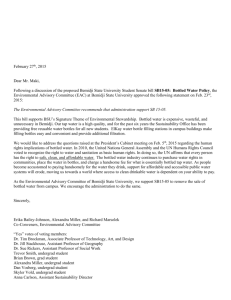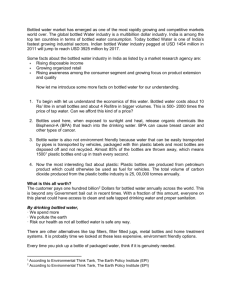Banning Bottled Water on Your Campus
advertisement
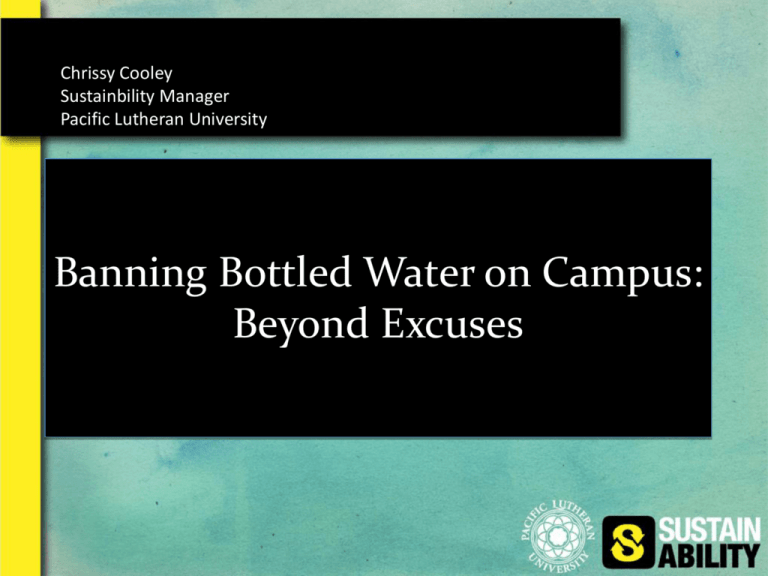
Chrissy Cooley Sustainbility Manager Pacific Lutheran University Banning Bottled Water on Campus: Beyond Excuses Remembering our Connection The Cuyahoga caught on fire in 1868, 1883, 1887, 1912, 1922, 1936, 1941, 1948, and in 1952. The 1952 fire caused over 1.5 million dollars in damage. This is a picture from the 1969 fire, the fire most often remembered. 3 Remembering our Connection Aftermath of the 1969 fire Cleanup efforts continuing to this day 4 Remembering our Connection Bottled water is not safer, not tastier 5 Environmental Impact o Waste Stream – only about 30% of plastic bottles end up in the recycling o Virtual Waste - ie transportation, refrigeration, water use in the manufacturing of temporary bottles o Mining of the Water 6 Social Injustice • Privatization of drinking water • Communities right here in the US are giving up their free public water to be bottled at a cost • Bottled Water plants bring very few, low -wage jobs 6 The University Connection As Sustainability Professionals an average day at the office probably includes: • Waking up early to bus/bike/carpool • Entering utility bill data • Managing all of the recycling, irrigation, natural gas & electricity policies on campus • Being available to anyone at all that pops in • Saying the words “people, planet, prosperity” at least 500 times a day Generally being too busy to take on a campaign that no one is talking about anyways. The Challenge The challenge is not banning bottled water! A Ban on Bottled Water meets a deeper need. The challenge is really to: • find ways to apply our efforts to real sustainability goals • change systems, not minimize the symptoms • find a way to not just be “less bad” but to do real good • work on a cause that will simultaneously build bridges across your entire campus • float an idea that will open minds to the full definition of sustainability The Way to Do It There are currently over 90 higher education institution in North America that have limited bottled water on campus Change Management Unfreezing 1. Introduce Urgency 2. Assemble your guiding team 3. Create a common vision 4. Communicate for buy-in 5. Empower Action Change 6. Create Short Term Wins 7. Do not let up! Refreezing 8. Build into existing structures - John Kotter Unfreezing Introduce Urgency • The power of public narrative • Start with your connection, and be able to move into a shared purpose I should say that it is disturbing that the banning of bottled water is too often thought of as a waste reduction initiative (i.e. we'll use fewer plastic bottles)… The issue is about the co modification of water and about all of the environmental impacts of the beverage industry. – University of Winnepeg Unfreezing Assemble your guiding team by identifying your mavens and seek out your opposition “In spring, 2011, an undergraduate student proposal was presented to the University Sustainability Council that sought to reduce the consumption of bottled water on campus. The Council recognized the many issues surrounding bottled water and established a Bottled Water Committee to review the matter. This Committee consisted of key stakeholders including students, faculty and staff representing Dining Services, Student Affairs, Business Services and Athletics.” - University of Maryland Unfreezing Empower Action • Thank you notes! • Leave ample time for dialogue • Allow students to be inspired – and get out of their way • Provide resources where needed • Student Green Fees • Sample campaigns • Film showings Food and Water Watch TBTT National Forum Group Katy Kiefer, Activist Network Coordinator (kkiefer@fwwatch.org) Unfreezing Create a common vision and communicate for buy-in “Water privatization is the reason why the student body voted to ban the sale of bottle water as selling bottled water is in direct conflict with Jesuit values of social responsibility.” – Loyola University Chicago The Change Create Short Term Wins and do not let up! • Getting reusable bottles in hands • Filtered Water Stations • Communicate positively for events Refreezing Build into existing structures • Catering Contracts • Vending agreements • Written posted policy • New student orientation • Keep the coalition strong for this stage Change Management “I think students often think that the administration will be resistant to changes and that's not always the case. This was an example where students wanted something, provided a case for it and reasoning behind it, and CDS worked hard to implement it -- and it worked! It is something people can look to and note that CDS (and College administration) is a lot more receptive to ideas than the students might think.” - Oberlin College Inhibitors to Change Fear Hope Apathy Anger Self-Doubt You Can Make a Difference Inertia Urgency ~ Marshal Ganz When to Tap Out Don’t forget that even if a ban is not possible, work to reduce the existing demand now will make it possible in the future. • Fringe users such as vending machines, sports events, leased spaces, etc, should not stop you in your tracks • This is not a zero-sum game Your University What would stop you from removing bottled water from your campus? Chrissy Cooley cooleysc@plu.edu 253.538.6060 #beyondexcuses The Way to Do It University of Ottawa David Rousseau University of Washington St. Louis - Deborah Singer Howard Pacific Lutheran University September 2010 Dining &Sustainability January 2009 Chancellor& Sustainability April 2011 Students &Sustainability Food sales went up instead Changing image to be more Able to relate sustainability of down innovative directly to social justice Defining bottled water apart from juice Hostility in working from a top-down model Vending machine contracts/image
